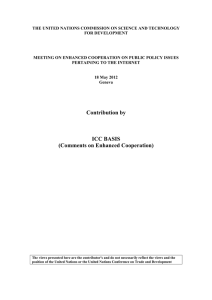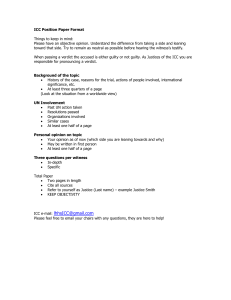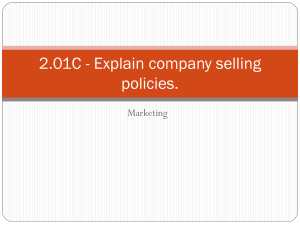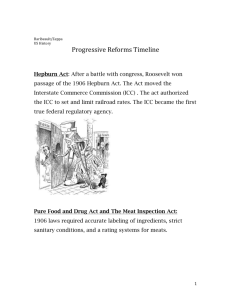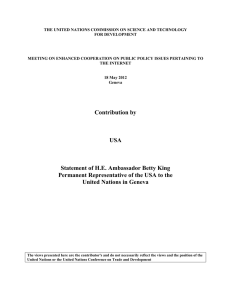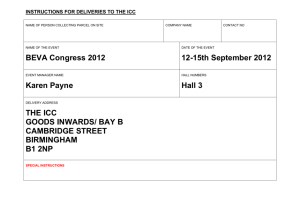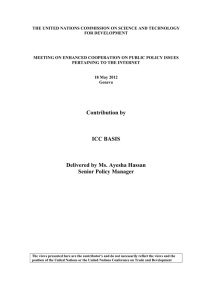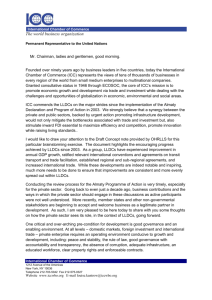COMMISSION ON SCIENCE AND TECHNOLOGY FOR DEVELOPMENT (CSTD) Fifteenth Session
advertisement
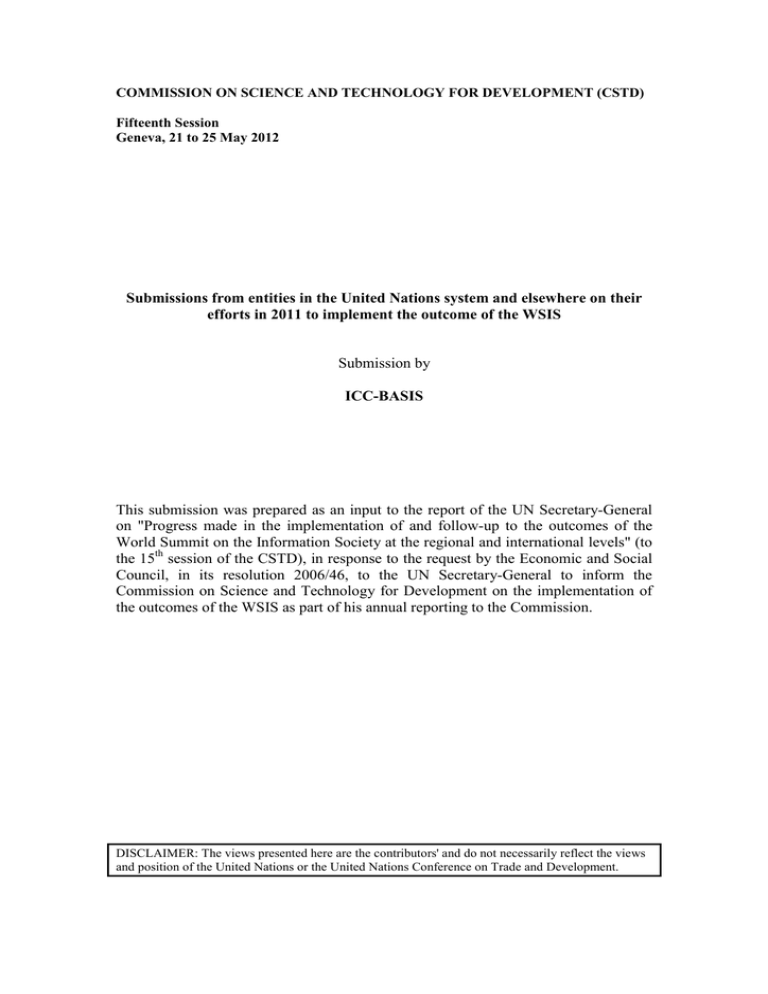
COMMISSION ON SCIENCE AND TECHNOLOGY FOR DEVELOPMENT (CSTD) Fifteenth Session Geneva, 21 to 25 May 2012 Submissions from entities in the United Nations system and elsewhere on their efforts in 2011 to implement the outcome of the WSIS Submission by ICC-BASIS This submission was prepared as an input to the report of the UN Secretary-General on "Progress made in the implementation of and follow-up to the outcomes of the World Summit on the Information Society at the regional and international levels" (to the 15th session of the CSTD), in response to the request by the Economic and Social Council, in its resolution 2006/46, to the UN Secretary-General to inform the Commission on Science and Technology for Development on the implementation of the outcomes of the WSIS as part of his annual reporting to the Commission. DISCLAIMER: The views presented here are the contributors' and do not necessarily reflect the views and position of the United Nations or the United Nations Conference on Trade and Development. ICC BASIS input to the UN Commission on Science and Technology for Development (CSTD) report for its 15th session, May 2012 The International Chamber of Commerce (ICC) and members of its BASIS initiative (Business Action to Support the Information Society) are pleased to provide input to the UN CSTD’s consultation in preparation for its 15th session in May 2012. The CSTD has emphasized the intersection of the WSIS follow up role entrusted to it by the WSIS Tunis Agenda and its critically important role regarding identifying how science and technology are essential for development, through the improvements that they bring to the lives of people around the world and how they empower the individual. Business initiatives furthering WSIS action lines and goals Since last year, several business initiatives and partnerships with governments and other stakeholders are continuing the efforts to expand ICTs around the world and promote their adoption in key applications to further the WSIS action lines and goals. There are too many to provide an exhaustive list. The following are some concrete examples of successful business initiatives which are implementing the WSIS action lines and goals. While every one of these examples implements several different WSIS action lines simultaneously, this select sample is organized according to the most relevant action line(s): C10 and C4 Action lines: Ethical dimensions of the Information Society & Capacity Building Proniño Programme Telefonica, S.A. Telefonica undertook a business initiative to eradicate child labor through the creation of programs which facilitate access to quality education for children and adolescents in Latin America. Network-collaborative learning and social networks are installed in areas with high rates of child labor to provide internet access to students, as well as a space to exchange best practices, advice and training for educators and social agents assisting the local children (pp. 2729; 136-138). http://www.rcysostenibilidad.telefonica.com/rcysost2010/Telefonica_RC10_En.pdf C7 Action line: ICT applications - benefits in all aspects of life The Mogalakwena HP i-Community, Hewlett-Packard. Through public-private partnerships between HP and national, provincial and municipal governments in South Africa, a rural region was transformed into a thriving community that is economically and environmentally sustainable thanks to information technology. http://www.wbcsd.org/web/publications/case/hp_mogalakwena_icommunity_full_case_w eb.pdf 1 15 December 2011 Partnerships for Technology Access, Microsoft. Public-private partnerships between Microsoft and governments to provide relevant and affordable solutions to advance key public policy objectives. Examples include empowering small businesses to bid for government contracts online and digitalize their operations in Chile; modernized teacher training in Guatemala through computers and educational software; and facilitated pension delivery for seniors in Argentina. http://www.ungis.org/LinkClick.aspx?fileticket=PDUatTYv3qA%3D&tabid=621 C2 and C3 Action lines: Information and communication infrastructure & Access to information and knowledge Cisco Sub-Saharan African Initiative, Cisco. Through partnerships with nongovernmental organizations, Cisco’s initiative addresses issues of poverty alleviation in five Sub-Saharan African countries and assists communities and individuals in joining the global marketplace. Affordable housing, community connectivity points, online content and tools, and hands-on training are the solutions applied on the ground to achieve their objectives of sustainability, replicability and cost effectiveness. http://www.cisco.com/web/about/citizenship/socioeconomic/specialprograms/docs/CiscoAfricaInitiativePreso.pdf C4 Action line: Capacity Building Kidsmart Guide to Early Learning and Technology, IBM. An IBM initiative that involves partnerships with early learning organizations and Ministries of Education to establish learning centers consisting of IBM computer hardware and educational software available to 3-6 year old children from low income families in the United States, Europe, the Middle East and Africa. The goal is to address social needs and reduce the digital divide between these children and their peers with greater opportunities, as well as provide high quality training for teachers and involve parents. http://www-05.ibm.com/dk/ibm/ibmgives/pdf/kidsmartEvalueringsreferat.pdf European Alliance on Skills for Employability, Microsoft, Cisco, and CompTia. Companies partner with the European e-Skills Commission to provide IT, technical and other employability related skills for people from disadvantaged groups, thus contributing employability and inclusion in Europe. http://www.employabilityalliance.eu/upload/polish_factsheet.pdf World Ahead Program, Intel. Intel collaborates with governments, telecommunications providers and technology companies, financial institutions, healthcare institutions, and other organizations to accelerate technology access and market development. The result is comprehensive, long-term approaches that enable citizens to acquire 21st century skills and participate in the global economy. For in2 15 December 2011 stance, Intel’s holistic blend of technology, programs, and resources helps prepare students from kindergarten to college for a brighter future. Intel has worked with governments and other organizations to create effective eLearning programs. These programs combine technology, connectivity, teacher development, and digital content to help students learn more effectively Intel Teach has taught over 7 million teachers in 50 countries how to successfully integrate technology into classrooms to improve learning Moreover, Intel’s ICT for Education Program is donating 100,000 PCs worldwide to help promote classroom learning. http://www.intel.com/content/dam/doc/article/world-ahead-program-brochure.pdf Connect To Learn, Ericsson. 21st century education in the Networked Society, Connect To Learn is a collaborative effort between Ericsson, the Earth Institute and Millennium Promise that leverages the power of Information and Communications Technology (ICT) to bring a high quality education to students everywhere. http://www.ericsson.com/thecompany/sustainability_corporateresponsibility/enabling _communication_for_all/connect_to_learn Yes, I can! Initiative, Deutsche Telekom AG. This initiative aims at the acquisition of personal skills by children and young people. These skills include, among others, media competence, conflict resolution and, more generally, an improvement of the technological and social skills of children and young people from disadvantaged environments. To date, this initiative has reached over 30,000 children and young people through 140 projects. http://www.telekom.com/dtag/cms/content/dt/en/676024 C1 and C6 Action lines: The role of governments and all stakeholders in the promotion of ICTs for development & Enabling environment The Role of the Private Sector in Expanding Economic Opportunity through Collaborative Action, Various ICT companies. The Corporate Social Responsibility (CSR) initiative of Harvard University’s John F. Kennedy School of Government outlines the importance of public-private collaboration and highlights how companies play a role in expanding economic opportunity in communities around the world. Several ICT companies’ initiatives are featured in a list of participants’ initiatives, covering areas such as creating inclusive business models, developing human capital, and building institutional capacity. http://www.hks.harvard.edu/mrcbg/CSRI/publications/report_29_Harvard%20EO%20Dialogue%20Summary%202007101 8.pdf 3 15 December 2011 C2 and C3 Action Lines: Information and communication infrastructure & Access to information and knowledge Millenium Villages, Ericsson. Mobile connectivity is a key enabler in helping to fulfill the Millennium Development Goals. More than 500,000 people throughout 11 countries in sub-Saharan Africa benefit from mobile connectivity as a result of the Millennium Villages Project. http://www.ericsson.com/thecompany/sustainability_corporateresponsibility/enabling_co mmunication_for_all/millenium_villages Special IGF host country Kenya/ITU ministerial event Several ICC BASIS member companies and associations participated in the special ministerial event hosted by the government of Kenya and the ITU before the IGF, including: ICC’s Secretary General, Jean-Guy Carrier; S. Ramadorai, Chair of the BASIS initiative and Vice Chairman, Tata Consultancy Services; Brad Smith, Microsoft; Gabrielle Gauthey, Alcatel-Lucent; Jeff Brueggeman, AT&T; Kathy Brown, Verizon; Jussi Hinkkanen, Head of Government Relations, MEA, Nokia; Hossein Moiin, CTO, Nokia Siemens Networks. Internet Governance Forum 2011 This year’s Internet Governance Forum (IGF) in Nairobi, Kenya, was a great success, with a record number of participants, and deeper substantive discussions in many sessions and workshops. One of the key WSIS principles is building multistakeholder involvement in ICT and Internet policy discussions. The IGF provides an excellent and unique opportunity for all relevant stakeholders—governments, IGOs, business, civil society and the Internet technical community to come together on an equal footing to exchange views, experiences, challenges and good practices on a range of Internet governance (IG) issues. Once again, the IGF 2011 built on previous events to tackle IG policy issues, build communications and relationships between stakeholders and help stakeholders understand each other better. In turn, this leads to more informed policy decisions by all. ICC BASIS and the government of Kenya co-organized an interactive workshop on ‘Mobile and cloud services for development’. http://www.iccwbo.org/uploadedFiles/BASIS/Documents/ICC%20BASIS%20and%20Governm ent%20of%20Kenya%20IGF%202011%20Workshop%20Report_Mobile%20and%20Cloud%20 Services%20for%20Development.pdf This multistakeholder discussion identified key policy and regulatory issues that enable the uptake of these services and explored challenges and opportunities. This workshop was one of several discussions at the IGF that examined the Internet governance policy choices and options related to mobile Internet and cloud computing. ICC BASIS companies and associations co-organized many workshops at the IGF and provided support for other events. http://www.intgovforum.org/cms/2011/Agenda/IGF6Schedule28Sept.xls 4 15 December 2011 ICC BASIS has also produced a report about business activities at the IGF in Nairobi which will be available shortly on the website at: http://www.iccwbo.org/basis Business participation in WSIS related meetings Global business actively participated in the following WSIS related meetings in 2011: IGF taking stock and preparatory open consultation, and multistakeholder advisory group meeting, February IGF preparatory open consultation and MAG meeting, May WSIS action lines Forum, May WSIS facilitators meeting, May WSIS +10 review consultation, May CSTD meeting, May ICC’s Commission on E-Business, IT and Telecoms (EBITT) policy and practice products In the past year, and over the course of the past several years, ICC’s EBITT Commission has produced several policy and practice recommendations that outline the most effective enabling policy and regulatory frameworks for implementing many of the WSIS goals and action lines. We have not included these recommendations in previous inputs to the CSTD report, and take this opportunity to highlight the most recent recommendations, along with a compilation of past recommendations. - EBITT inventory (1998-2011) - Discussion paper on the adverse effects of discriminatory taxes on telecommunication services (2010) http://www.iccwbo.org/policy/ebitt/display7/folder85/index.html http://www.iccwbo.org/uploadedFiles/ICC/policy/ebusiness/Statements/ICC_DiscussionPaper_TelecomTaxes_26Oct10.pdf - Policy statement: Global business recommendations and best practices for lawful intercept requirements (2010) http://www.iccwbo.org/uploadedFiles/ICC/policy/ebusiness/Statements/373492LawfulInterceptPolicyStatementJune2010final.pdf - ICC comments on EU Directive 95/46/EC (2011) - Discussion paper: Internet backbone interconnection agreements (2011) - Discussion paper: Approaching shortages of mobile broadband spectrum threaten to limit broadband deployment and economic growth (2011) http://www.iccwbo.org/uploadedFiles/ICC/policy/ebusiness/Statements/ICC%20Comments%20on%20EU%20Directive%20Review%2015%2001%202011.pdf http://www.iccwbo.org/uploadedFiles/ICC/policy/e-business/Statements/ITIS_IBIA.pdf http://www.iccwbo.org/uploadedFiles/ICC/policy/ebusiness/Statements/ICC%20_Discussion_Paper_Mobile_broadband_spectrum_20Oct11final.pdf 5 15 December 2011 About the International Chamber of Commerce (ICC) The International Chamber of Commerce is the largest, most representative business organization in the world. Its thousands of member companies in over 120 countries have interests spanning every sector of private enterprise. A world network of national committees keeps the ICC International Secretariat in Paris informed about national and regional business priorities. More than 2000 experts drawn from ICC’s member companies feed their knowledge and experience into crafting the ICC stance on specific business issues. The United Nations, the World Trade Organization, and many other intergovernmental bodies, both international and regional, are kept in touch with the views of international business through ICC. For more information please visit: www.iccwbo.org About BASIS ICC created BASIS to raise awareness among the public, governments, civil society, intergovernmental organizations and technical community of what business requires to continue contributing to the development of the Information Society. It serves as the voice of business in the global dialogue on the Information Society, following two World Summits on the Information Society (WSIS) held in Geneva (2003) and Tunis (2005). To promote the environment in which business around the world will continue to thrive as an innovator of information and communication technologies, BASIS participates in UN-linked forums set up to continue the dialogue, such as the Internet Governance Forum (IGF) and the WSIS follow up and implementation processes, and the UN Global Alliance for ICTs and development (GAID). To help shape the agenda and participate in these global discussions, BASIS relies on the policies developed in the ICC Commission on E-business, IT and Telecoms as the foundation for its efforts. BASIS builds on the activities and network of the Coordinating Committee of Business Interlocutors (CCBI), which ICC formed to coordinate participation by world business in the processes leading up to and at WSIS. BASIS members include business organizations such as the TechAmerica, World Information Technology and Services Alliance (WITSA), Africa Investor, Global Information Infrastructure Commission (GIIC), Japan Business Federation (Nippon Keidanren), and the Association for Competitive Technology (ACT) as well as several ICC national committees and companies from across sectors and geographies. For further information regarding BASIS, the founding partners, members and activities, visit: www.iccwbo.org/basis 6 15 December 2011
